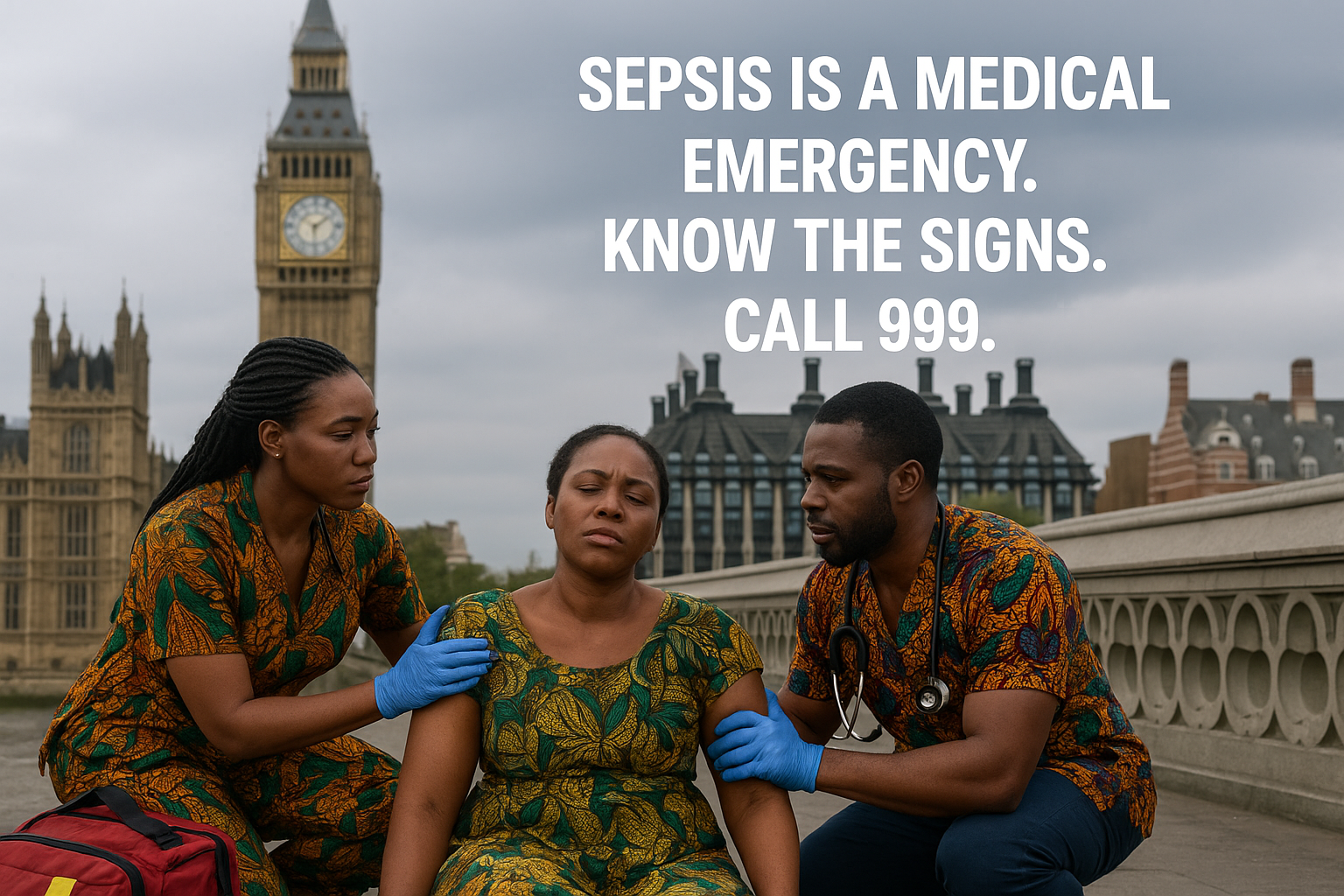Sepsis is a life-threatening reaction to an infection. It can be difficult to spot, and symptoms may look like flu, chest infection, or even just “feeling unwell.”
👉🏾 If you or someone you care for shows signs of sepsis, call 999 immediately or go straight to A&E. Trust your instincts.
🚨 Symptoms of Sepsis in Adults & Older Children
Call 999 or go to A&E immediately if you notice:
- Acting confused, slurred speech, or not making sense
- Blue, grey, pale, or blotchy skin, lips or tongue (on brown/black skin, check palms & soles)
- A rash that does not fade when you roll a glass over it (like meningitis)
- Difficulty breathing, very fast breathing, or struggling to catch breath
🚼 Symptoms of Sepsis in Babies & Young Children
Call 999 or go to A&E immediately if a baby/child shows:
- Blue, grey, pale, or blotchy skin, lips or tongue (check palms/soles on darker skin)
- A rash that does not fade under a glass
- Difficulty breathing (grunting noises, tummy sucking under ribs, fast breathing)
- A weak, high-pitched cry (not their usual cry)
- Unresponsive, unusually sleepy, or uninterested in feeding/activities
- Hard to wake up
⚠️ Note: They may not have all these symptoms.
📞 Urgent Advice – Call NHS 111 If:
- You or your child feel very unwell or “something’s not right”
- No urine all day (adults/older children) or in last 12 hours (babies/young children)
- Repeated vomiting, can’t keep food or milk down
- Swelling or pain around a cut or wound
- Very high or very low temperature, shivering, or feeling hot/cold to touch
💡 NHS 111 can connect you to a nurse/doctor or send an ambulance if needed.
Who Is More at Risk?
Sepsis can affect anyone, but higher risk groups include:
- Babies under 1 year
- Adults over 75
- People with diabetes
- People with weak immune systems (HIV, chemotherapy, organ transplant)
- People with sickle cell disease or Down’s syndrome
- Women after childbirth, miscarriage, or abortion
- People who recently had surgery or a serious illness
- People with dementia, learning disabilities, or communication difficulties
🛡️ Prevention Tips
✅ Keep up with vaccines (especially babies, children, elderly, pregnant women)
✅ Wash hands regularly & teach children proper handwashing
✅ Clean & care for wounds properly
✅ Take antibiotics correctly – finish the full course
❌ Don’t ignore suspicious symptoms.
Treatment in Hospital
Sepsis needs urgent hospital treatment. Most patients are given antibiotics within 1–6 hours. If untreated, sepsis can lead to septic shock, organ failure, or death.
Treatment may include:
- Intensive care
- Breathing support (ventilator)
- Surgery to remove infected tissue
Recovery & Life After Sepsis
Many recover fully, but it can take weeks or months. Some experience post-sepsis syndrome with tiredness, poor sleep, low mood, anxiety, or PTSD-like symptoms.
Tips for recovery:
✅ Rest – don’t rush it
✅ Eat small, regular meals
✅ Gentle exercise to build strength
✅ Get GP support for ongoing physical or emotional symptoms
🔑 Key Takeaway for Nigerians in the UK
- Sepsis symptoms can look different on brown/black skin – always check palms & soles.
- Call 999 for emergencies. Do not drive yourself; ask someone or call for an ambulance.
- Share this info with family, especially new mums, elderly parents, and anyone with diabetes or sickle cell.
📖 More info & children’s symptoms video: NHS Sepsis Guidance
Join Our WhatsApp Channel
Stay updated on the latest UK news, including education, health, job openings, and more for those living in the UK!
Join here: Naija UK Channel
Also, follow us on our social media channels for the latest updates and discussions:
- Twitter: @NaijaUKConnect
- Facebook: Naija UK Connect
- Instagram: @naijaukconnect




